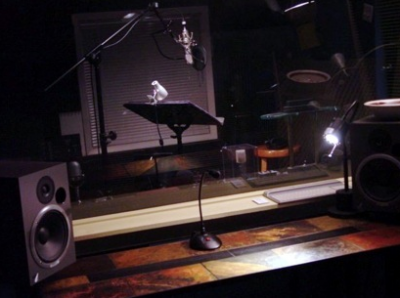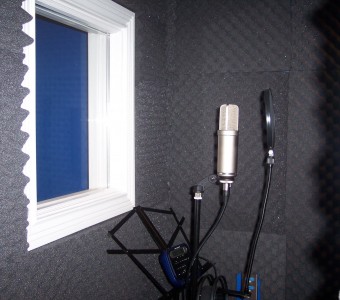While Nolan North may have the voice acting booth monopolized for the past few years, there has been one clear set of vocal chords gamers have been hearing at remarkable frequency decades before North got his first mo-cap suit. JS Gilbert has a near Don LaFontaine-sized back catalog to his name, and has the extra benefit of not being dead for the past three years. Most noted for his work as Twisted Metal‘s demented clown mascot Sweet Tooth, JS has been cast from “additional voices” to leading men across multiple media, and we had the chance to sit down with the Master of Gruff and reflect on his career, as well as the industry that gave him the clown mask.
Elder-Geek (EG): To open up with a bit of background, can you tell us how you got into voice acting? And what lead you to video games in particular?
 JS Gilbert (JS): Growing up I represented a dichotomy of sorts; I was a quick learner and scored well on exams, but I was also a class clown and a bit of a trouble maker. I would impersonate teachers and friend’s parents, as well as some celebrities. My actual start came over two decades ago, when I was working in advertising and marketing, writing and producing some radio spots. One day, the talent was somewhat disagreeable (perhaps hung-over) and it wasn’t working. The station had no one else and before I could call a possible candidate, the station engineer said “You have a nice voice and you obviously know the spot, you want to try reading it?” I did and that turned into me becoming the voice talent.
JS Gilbert (JS): Growing up I represented a dichotomy of sorts; I was a quick learner and scored well on exams, but I was also a class clown and a bit of a trouble maker. I would impersonate teachers and friend’s parents, as well as some celebrities. My actual start came over two decades ago, when I was working in advertising and marketing, writing and producing some radio spots. One day, the talent was somewhat disagreeable (perhaps hung-over) and it wasn’t working. The station had no one else and before I could call a possible candidate, the station engineer said “You have a nice voice and you obviously know the spot, you want to try reading it?” I did and that turned into me becoming the voice talent.
After a few months a “real” client hunted me down through the radio station to ask me to narrate a piece on the Wine Country. Despite having been in business my entire life, I was definitely bit by the voice acting bug. I dabbled for several years, mostly because I was making good money with regular work and I had always heard the term “starving artist”. Eventually though, I started to take it more seriously and doubled up on improv training, some traditional acting classes and a few specific voice acting classes. There was no internet, no books or really much else for an aspiring voice actor back then, and really very few V.O. teachers.
But, as far as the craft was concerned, there were some fairly straight paths. It was rather organic and I was enjoying a renaissance within the local advertising industry. The San Francisco Bay Area became the darling for commercial making. Clients would fly in, spend a few days making a commercial, stay in a charming bed and breakfast, then go visit the Wine Country or tour Fisherman’s Wharf. Eventually I made a demo and got an agent, but my focus was then, as it is now, on commercial V.O. work. Video games came a bit later and had a lot to do with my living in San Francisco, which was the hub for game activity in the early years.
EG: You’ve done work both as prominent main characters, and as small bit roles. What – if any – is the difference in preparing for and performing each type of role? Are there any differences to how the acting sessions are produced?
JS: The major difference really is just scheduling. Smaller parts can often be banged out in an hour or two. Some other roles, not just in epic games, can require numerous sessions across months of time. I can tell you that every producer I have worked for has worked a little differently in some way. I don’t think that I approach the character any differently whether he has a relatively small role to play in the project or is the main character. There are occasional concerns, such as when you are playing two or more characters who may engage each other in the game. Making sure the voices and the characters are all distinguishable and unique is important.
EG: Do you play the games in which you’re a featured voice, and if so, how does that affect your gameplay experience?
JS: At one time I was a big gamer. I had an Atari 2600 and a Commodore 64. I was a member of several SIGs for both platforms. Even later with the Atari ST, Nintendo, Playstation and even the PC, I was a pretty avid gamer. I think it may be a combination of games getting so sophisticated now, as well as a very busy schedule, that leaves little time for gaming. I will usually go down to one of the Electronics stores and play the store demos of games that I’m featured on, sometimes I will get the game and play it. I play some casual and handheld games, because they’re a bit easier to play and I’m generally not tempted to sit and play them for 30 hours straight.
EG: Having worked as a voice actor outside video games, is there any notable difference as to how voice acting is produced?
JS: That’s like asking what the differences are from one restaurant to another. Menus vary, cuisines vary, decor varies.
The type of work often dictates how production is handled, such as voice mail, audio book, e-learning, commercials and so forth. Even  within those categories, differences can be immense. While not the bulk of any actors work, recording sessions for big budget TV commercials can consume half of a day, and might have me back several times. [A lot of] talent now have home studios. I also have ISDN, which means I can be recorded in any studio digitally in real time. It’s just like being there, except I’m not. There’s also phone patching and Skype as alternative ways to record a talent remotely and be able to monitor and direct them. This means that talent from anywhere could be available to work on almost any project. The gaming community has been [comparatively] very slow to adopt ISDN or phone patch for record sessions with talent, although I have done several jobs for games that have involved either ISDN or Skype. Time Tables, an actor’s availability, budgets and many other factors can enter into record sessions. Often, with regards to narration for example, I am sent scripts and there is no direction taking place.
within those categories, differences can be immense. While not the bulk of any actors work, recording sessions for big budget TV commercials can consume half of a day, and might have me back several times. [A lot of] talent now have home studios. I also have ISDN, which means I can be recorded in any studio digitally in real time. It’s just like being there, except I’m not. There’s also phone patching and Skype as alternative ways to record a talent remotely and be able to monitor and direct them. This means that talent from anywhere could be available to work on almost any project. The gaming community has been [comparatively] very slow to adopt ISDN or phone patch for record sessions with talent, although I have done several jobs for games that have involved either ISDN or Skype. Time Tables, an actor’s availability, budgets and many other factors can enter into record sessions. Often, with regards to narration for example, I am sent scripts and there is no direction taking place.
EG: As video games budgets have grown to accommodate an increasing media dominance, have you noticed any changes in studio’s treatment of their voice actors, or how voice acting is structured for major game releases?
JS: There are hundreds and hundreds of titles that get released at all levels. Not all blockbuster games rely heavily on dialog to drive the game. I suppose if anything, it’s Business with a capitol “B”. Games are still a great deal of fun to work on, but they are part of an industry that now grosses more than the film industry in the United States. But despite the fact that we now have massive amounts of room to hold dialog and budgets have gone up immensely, I don’t think that – in most cases – dialog has kept pace. We see incredible sound design and music scores that rival blockbuster movies. To my ear, gaming dialog, even at its best sounds like a “B” movie or even a dubbed movie.
EG: What sort of reasoning could you see for such a divide?
JS: Perhaps it’s based on studies that have shown that music and effects tend to be of far greater import to the gamer. Maybe it’s because there’s too much emphasis on having everybody involved in the dialog recording process be a “gamer”. I don’t know. To me it should be acting first and foremost. I remember the very early days of dialog when I would call up a game developer and ask how they were looking for their voice talent. Often the answer would be “We’re gonna get a few pizzas and some 6 packs and do it ourselves.” Certainly, for the most part this is no longer a prevailing attitude. But with seemingly everybody you meet trying to get into voice over; more than a few games games seem to still be done this way. Some just sound like it.
It seems to me that most of the people in gaming who work on dialog recording come from strong music, sound design and audio engineering backgrounds. It would be nice to see more individuals with backgrounds in acting, theater and related areas get involved. I’ve also had several discussions with audio professionals whereby most of us seem to be in agreement, that across the board, dialog recording in general isn’t being given the import it once was. I am on GVAC (GANG Voice Actor Coalition), which is part of the Game Audio Network Guild. The committee has some pretty heavy hitters, and I don’t speak for them or on their behalf, but as a group, we are working towards trying to create some [better] case scenarios for the gaming industry as it relates to dialog recording. I think that we all believe that game dialog can be done much better.
EG: You’ve worked on both Western projects and localized games, is there more of a challenge to recording against already completed facial animations and lip synchronizations?
 JS: ADR (Automated Dialog Replacement) is slow and challenging. There are so many factors, which include the translations. Do they fit the mouth movements well? Are they too literal, stifled or otherwise sound strange? Is the timing off? Then there’s the aspect of having to stay in character, show appropriate emotion and make sure everything lines up. Very few of the projects I’ve worked on in the past 5 years have been one’s where I had to do ADR. Even the ones being localized now usually use programming to take care of facial expressions and mouth movements. Some of the games will use Mo Cap for each of the talent, whereby as the actor speaks in his or her respective language, the mouth movements and facial expressions of the actor are sent to CG and are changed within the game. Well, I suppose this would be pretty tricky to do from a home studio, so there is that aspect that might effect a game working with talent remotely.
JS: ADR (Automated Dialog Replacement) is slow and challenging. There are so many factors, which include the translations. Do they fit the mouth movements well? Are they too literal, stifled or otherwise sound strange? Is the timing off? Then there’s the aspect of having to stay in character, show appropriate emotion and make sure everything lines up. Very few of the projects I’ve worked on in the past 5 years have been one’s where I had to do ADR. Even the ones being localized now usually use programming to take care of facial expressions and mouth movements. Some of the games will use Mo Cap for each of the talent, whereby as the actor speaks in his or her respective language, the mouth movements and facial expressions of the actor are sent to CG and are changed within the game. Well, I suppose this would be pretty tricky to do from a home studio, so there is that aspect that might effect a game working with talent remotely.
I seemed to pick up on the whole dubbing thing pretty easily, although I can’t really tell you what I do or in any way could try and teach it to someone. Maybe it’s the way my brain is hard wired. As a kid I would enjoy pretend dubbing, by turning off the sound on the TV an make up what the characters were saying.
EG: Keeping with the topic of foreign games, there seems to be a celebrity factor to video game voice acting in some Japanese releases (i.e. Sega’s Yakuza series) that arguably hasn’t translated in the West. Why do you think that voice actors are not advertised alongside their games as much in the States?
JS: Whether the goal is to get celebs into a game – such as with Bruce Willis on Apocalypse – or to try and manufacture [celebrity status] by promoting “average Joe” on a game through YouTube, neither tends to be of too much importance. There are of course a few names that are highly respected as game talent. A few of those actors have tremendous followings in social media. I suppose it may be that gaming is a bit more of a personal experience and interactive, vs. the more passive experience of television or films. In a game, the player strives to be the “star”. In Japan, they just seem to be into “fandom”. This can surround everyone from a politician to a reality star, to a business person. Perhaps it’s just more embedded in their culture.
If I had to say though, I think that the past year has seen a strong and growing interest in voice talent of all kinds in the United States. I think we will continue to see this trend grow, if for no other reason than the insane interest everyone seems to have in wanting to be a voice in a game.
EG: Finally, to leave on a bit of cliche note, any advice for anyone looking to get into voice acting, video game or otherwise?
JS: You have no idea how many times I am asked this question. I have to say that I’m not happy at the general mentality that voice over is glamorous, or that V.O. is a way to make a quick buck. The simple truth is that most of the people doing voice over, even those who claim to have been doing it for 5 – 10 years, make very little money compared to those who have been working as a grocery store checkout clerk, car sales, accountant, or most other “normal” jobs. I was very lucky. When I approached voice acting, it wasn’t built up the way it is today. We didn’t have a teaching/guru community of several billion dollars selling books [and] classes. Those that tended to get into voice over usually did so organically.
It seems that these days with individuals finding difficulty getting into more standard types of employment, they are lured into believing that getting into voice over is “pursuing their dream”. When one realizes how hard it is to make a buck at it, [they get] into even more financial difficulty. If you could imagine how hard it is to get a “job”, imagine that times 10. I still hustle for work on a daily basis after thousands of commercials and narrations, awards, hundreds of games. And if after all of that, you’re still planning on being a voice talent, then I wish you good luck and remind you that you will be competing against people like me. In the words of Sweet Tooth, “Don’t make me have to gut you like a little fish”.


I haven’t played a twisted metal game so I didn’t know who J.S Gilbert was until this =/
I really like hearing good voice acting in a game, don’t even need that motion capture or face technology like LA Noire and Uncharted uses, as long as the voice acting is really good(to go with the story and setting) the game is really good, makes the characters stand out.
I remember more characters from the PS2 days of games than the games these days being honest.
I think J.S Gilbert is right about how voice acting seems different today to how it was a while ago, it all just sounds more linear and… scripted(no pun intended =P) these days because it’s just more organized, more like a film.
But it kind of takes away from the game bit in my opinion, it’s like graphics in games – can’t believe I’m saying this because I admire Crysis but – with old games that had really crappy graphics they felt kind of better for the imagination, to me I liked using my imagination to fill in the game’s blanks instead of just seeing a photo realistic vista and then it just being that.
That’s what I think anyway, really cool page you should try and do this again from time to time.
Oh and Randy, if you and your team can, try and have a video and audio on this page of iconic quotes by Sweet Tooth or something please.